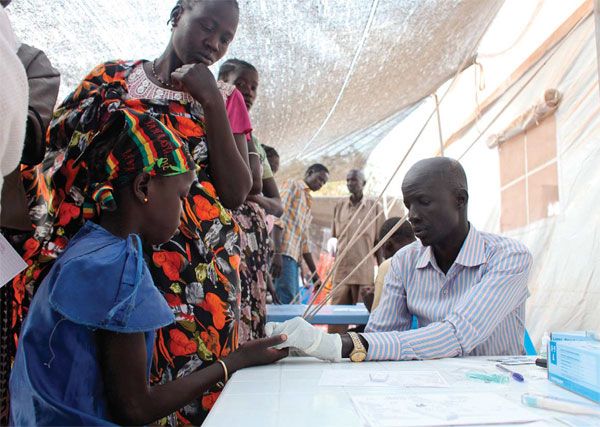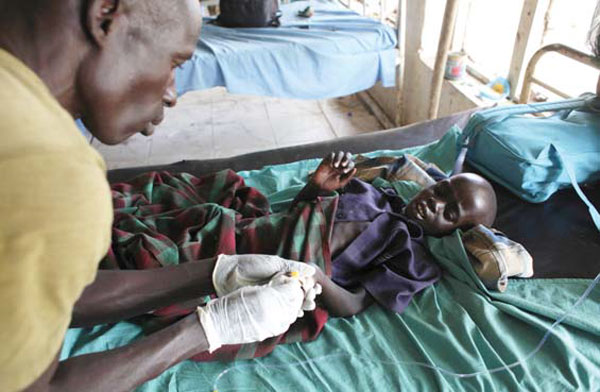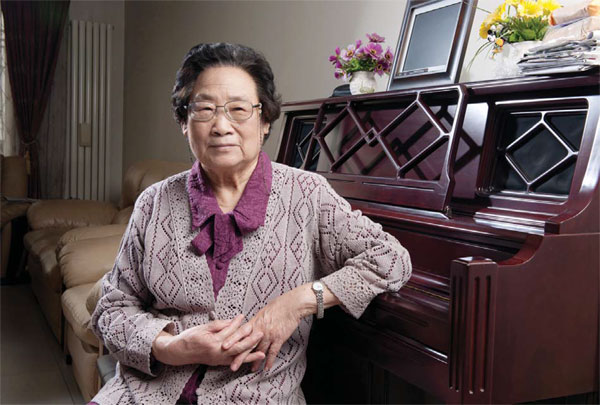African countries have applauded the success of the herbal expert Tu Youyou, the first Chinese to win the Nobel Prize in physiology or medicine, elevating hopes for the future of traditional Chinese medicine.
Tu shared this year's prize with Irish-born William Campbell and Satoshi Omura of Japan for her discoveries concerning a novel therapy against malaria, the Nobel Assembly at the Karolinska Institute in Stockholm announced on Oct 5.
Tu, 85, a researcher at the China Academy of Chinese Medical Sciences in Beijing, was honored for developing artemisinin, a drug therapy for malaria that has saved millions of lives worldwide.
Artemisinin, which Tu and her team discovered in the 1970s, is now the main drug in the arsenal against the disease, of which there are about 200 million cases a year, 600,000 of them fatal, nearly one-third the number in the early 2000s.
The therapy is said to work well in dealing with Plasmodium falciparum, the most common malaria parasite in Asia and Africa, and has saved more than 100,000 lives a year in Africa alone.
Matshidiso Rebecca Moeti, regional director for the World Health Organization in Africa, said artemisinin has significantly reduced deaths for patients suffering from malaria.
The discovery was "an exciting achievement", she said, and the Nobel Prize for Tu was well deserved.
Moeti, speaking during the second Ministerial Forum of China-Africa Health Development in Cape Town on Oct 6, said the contribution of artemisinin is more evident in Africa, where many of the tens of thousands that malaria kills every year are children.
With artemisinin, Africa has changed for the better and is better placed to achieve the United Nations Millennium Development Goals, while health workers in Africa all know the drug comes from China and appreciate that, Moeti said.
She described China as a great partner in Africa's development, particularly in health.
Africans have appreciated the many medical teams China has sent to the continent over the years, she said.
In a congratulatory letter to Tu, Premier Li Keqiang said the award "signifies China's prosperity and progress in science and technology, marks a great contribution of TCM to the cause of human health, and showcases China's growing strengths and rising international standing".
When Chinese officials paid a visit to Tu on Oct 5 to extend their congratulations, she said: "Artemisinin is a gift for the people of the world from TCM. It is of great significance for curing malaria and other infectious diseases and for protecting the health of people worldwide. The discovery of artemisinin is a successful example of collective research on TCM. The prize is an honor for China's science cause and traditional Chinese medicine in their course of reaching out to the world."
Cao Hongxin, head of the science and technology for the State Administration of Traditional Chinese Medicine, says the Nobel award was "an overdue honor" for Tu and the world's recognition of TCM.
Tu's great findings spearheaded the exploration for the modernization of TCM as well, he says.
In 1969, Tu started to chair a government project aimed at eradicating malaria. She was sent to Hainan, the tropical island off China's southern coast that has long struggled with its blight.
"The task I took on was to conduct research for a new drug from traditional Chinese herbal medicine to treat malaria," Tu said earlier. "Back then, we needed a totally new structured anti-malarial to deal with resistance to the existing drugs."
There, in sweltering rainforests, Tu witnessed up close the mosquito-borne disease's devastating toll on the human body.
"I saw a lot of children who were in the latest stages of malaria," she told the magazine New Scientist in 2011.
"Those kids died very quickly."
She would later say that the work was her top priority, "so I was ready to sacrifice my personal life".
Speaking of the moment she learned from television that she had been awarded a Nobel Prize, Tu says: "I was a little bit surprised, but not really. It's because (this prize) is not an honor just for me, but an honor for all Chinese scientists."
Tu and a team investigated more than 2,000 Chinese herb preparations and at first identified 640 that had possible anti-malarial activity but with no significant results in experiments with mice except for one: Artemisia annua extract.
In 2011, Tu became the first scientist on the mainland to win the United States' respected Lasker Award for the anti-malaria therapy.
Bunmi Saidat Salami, a Nigerian pharmacologist, describes Tu as "a renowned, hardworking woman" who has done research that has "made a breakthrough".
For artemisinin, "she submitted herself as the first human subject to test the drug".
An estimated 100 million malaria cases and about 300,000 deaths each year make Nigeria the country with the highest number of malaria casualties worldwide, according to the statistics released during World Malaria Day this year.
"Even when only few people believed in her, Tu showed commitment and went all-out in her efforts in bringing out a very good thing," Bunmi Saidat Salami says.
Gloria Omoghede, an attendant in one of the big pharmacies in the Nigerian capital, Abuja, says that every day many Nigerians go to pharmacies to buy anti-malaria drugs which, especially, are derivatives of artemisinin.
Malaria is responsible for 60 percent of outpatient visits to health clinics, 30 percent of childhood deaths, 25 percent of deaths in children under, and 11 percent of maternal deaths, according to the Nigerian National Malaria Strategic Plan 2014-2020.
In Rwanda, malaria researchers have applauded Tu's contribution in the fight against the disease.
Corine Karema, head of malaria and other parasitic diseases at the Rwanda Biomedical Centre, said she was delighted that this year's Nobel medicine prize had gone to people who had discovered tools that are now used to save the lives of millions.
"Particularly in Rwanda, we have chosen the most efficacious treatment based on artemisinin since 2006. Thanks to this approach, Rwanda has seen a decline of malaria cases and severe cases, as artemisinin combination therapies have contributed with mosquito nets to reduce the burden of malaria in Rwanda."
Rwanda has progressively managed to curb malaria related deaths. The proportion of deaths due to malaria has been maintained at 5 percent, official statistics show.
In Ghana, Torgbuiga Yaka IV, registrar at the Traditional Medicine Practice Council of the Ministry of Health, has called on the government to take steps to introduce the commercial cultivation of Artemisia annua (also known as sweet wormwood), saying the homegrown cultivation of the plant would boost the fight against malaria and reduce the cost of importing to a malaria-endemic country like Ghana.
"My greatest expectation is that the government takes steps to introduce its cultivation so that it cuts costs."
Kenyan officials and medical researchers joined their counterparts from other African countries to congratulate Tu for her contribution to the battle against malaria.
Waqo Erjesa, the head of malaria control for Kenya's Ministry of Health, says: "A Nobel Prize landing in the world of malaria is commendable, and the discovery of artemisinin by the Chinese scientist was a breakthrough in the fight against the killer disease. This drug has saved many lives."
Kenya has managed to reduce deaths related to malaria thanks to the availability of artemisinin at a subsidized cost in public health facilities, Erjesa says.
The country has had no recorded major outbreak of malaria since 2003, he says, although the tropical disease transmitted by mosquitoes remains a leading cause of deaths among pregnant women and children under five.
Kenyan regulators have been conducting therapeutic efficacy test on artemisinin every two years, he says.
"The last test we conducted on artemisinin in 2014 proved it is 98 percent effective. This drug is affordable to many people and costs less than $1."
China's TCM researchers have also been buoyed by Tu's achievement.
Liu Qingquan, head of the Beijing Hospital of Traditional Chinese Medicine, says the development of TCM must be combined with science and technology.
"If we cling to traditions and shun modern technology, all talk about TCM developing will just be empty words."
Wang Jian, president of Anhui University of Traditional Chinese Medicine, called for Chinese to cherish the "medical treasure" of TCM. "It comes from the empirical experience as well as wisdom of the Chinese nation distilled over thousands of years."
Wang says he hops TCM can be promoted and improved so as to make greater contributions to the health of people worldwide.

A girl is tested for malaria at a clinic in Tomping camp in South Sudan's capital Juba on Jan 10 last year. Andreea Campeanu / Reuters

A medic takes cares for a malnourished child with malaria at a hospital in Bor in South Sudan on March 15, 2014. Andreea Campeanu / Reuters

Tu youyou working in her lab in the 1980s

Tu Youyou at home in Beijing after winning the Nobel Prize. Li He / Xinhua

![Diseases, Symptoms, tcm, [tcmwindow.com]](/uploadFile/adImg/2015/11/11/f5cbfcc0-4df5-4646-9b9a-f316651a0199.jpg)





